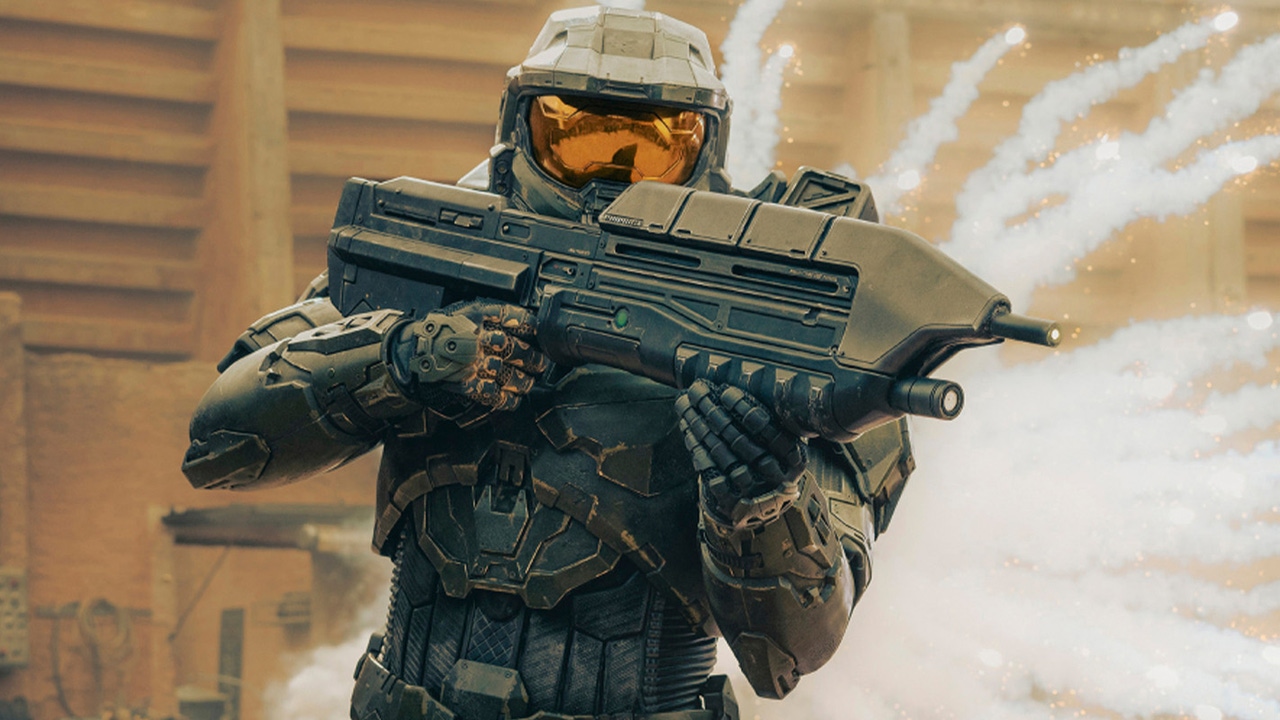Trending
Opinion: How will Project 2025 impact game developers?
The Heritage Foundation's manifesto for the possible next administration could do great harm to many, including large portions of the game development community.

Look a lot of awful things are going on in the world and to cope with it I am going to write about Halo. Specifically the now-cancelled Halo TV show known as "Halo The Series" on Paramount Plus.
You know, the one where we saw Master Chief have sex before we ever saw him on a Halo. And when he did arrive on a Halo...it was in the last half of the season 2 finale.
This was a real rough watch.
As a Halo fan who wants more people to love what I love about 343 Industries' (formerly Bungie's) science fiction series, this was obviously a disappointment. But that's fine! TV shows come and go. A lot of hardworking people took big creative swings, and there were plenty of times I went "that was a great episode of television" even while screaming about the overall creative direction.
But as an industry observer, I can't help but notice that the Halo show and Microsoft's game division are suffering from the same problem: a business and creative strategy that, in one way or another, can be summed up like this: "I'll be better tomorrow."
Let's do a quick compare-and-contrast of the first Halo game and the first season of the Halo show. In Halo: Combat Evolved, the player takes on the role of Master Chief, a super soldier cracked out of cryogenesis on a human warship fleeing a devastating loss against an alien species called The Covenant. The ship arrives over a mysterious ring called the Halo, its crew abandons ship and heads to the surface, and a war breaks out against The Covenant for control of the ring after everyone learns it's a massive superweapon. Then a zombie-like species called The Flood bursts from its innards, slaughters everyone, and only the Master Chief escapes.
(Yes I know other people escaped. I read the books and played Halo 2 that's called a retcon).
In the Halo TV show...oh boy. The human race is in an existential war with an alien species called The Covenant, which is hunting for mysterious artifacts scattered across the galaxy pointing to a mysterious superweapon. The Master Chief, aka John, and his squad find an artifact while defending a group of space colonists who also hate the government and that stays relevant because surviving colonist Kwan Ha sticks around to throw monkey wrenches into the plot. This sets John off on a quest to find other artifacts while also rebelling against the repression against the United Nation Space Corps who kidnapped him as a child and put a chip in him that suppressed his emotions when they turned him into a super soldier and there's this human named Makee who was kidnapped by the Covenant as a child because she has a special connection to the alien artifacts and so does John and they're both weird chosen ones and help i can't do this anymore.
I'll try to zip things up like this: Season 1 ends with the humans learning about the Halo. Season 2 follows the siege and destruction of the planet Reach, the battle that is shown in Halo: Reach, and ends with the Master Chief landing on the Halo in the last thirty minutes of the show. He and Makee have a standoff about how the Halo should be used and it ends on a cliffhanger.
That was less a "zip-up" and more "getting your zipper stuck on the fabric of your jacket."
In a final analysis the Halo show wasn't about the fight over the Halo, it was trying to answer a question that's often asked by executives giving script notes: why exactly do people care about the Halo to begin with? I fear Showrunner Steven Kane and the talented cast and crew working on the project were tasked with making a show about the broader Halo universe because someone higher up on the food chain was very insecure about a story set on Halo itself.
That's not an impossible task but it sure as hell is difficult. It gets even harder when you put the burden of writing such an arc on the shoulders of two people. Picking through the IMDB credits, you start to get a sense of how the business model of streaming services tore this show apart. Kane and writer Kyle Killen (who also has a 'developed by' credit) are credited with the bulk of the scripts across both seasons, with Basil Lee Kreimendahl listed as "staff writer" on season 2.
A few other writer's names pop up below them, but this smacks of what's become known as a "mini room" in the streaming era. Before the 2023 writer's strike, streaming service producers tried to pare down the number of writers staffed on a show by knocking out the entire scripting process with a small room of writers during the development process, with the showrunner executing those scripts once it goes to air. This process didn't always result in failure, but writers have discussed at length how it hurt careers and made an already-difficult task that much harder.
The final product gave off the inevitable of "trust us, we're doing something different, but we'll get to the Halo soon." Season one passed, and once again we were given the energy of "trust us, we're doing something different, but we'll get to the Halo soon." Then season 2 only gave us a snipped of Halo and by that point...well...everything was so different that the awe-inducing celestial object created by Bungie lost all of its punch.
This unfortunately sounds like the problem we highlighted with Xbox's strategy back in February. "Trust us, it'll be better soon" was the driving mantra behind Microsoft's many acquisitions, its new console, and the prospects for Game Pass. Now it's laid off over a thousand employees and is jacking up the price of Game Pass, splitting out which customers will have access to new games on day one.
In both cases, what was promised—implicitly or otherwise—just didn't come to pass.
If I had the answer to that question, I'd have Phil Spencer's job. Actually I might just settle for creative director at 343 Industries. That has to be a stress-free position, right?
Jokes aside, the lesson for the Halo brand and Xbox as a whole is right there in the Halo show itself: look at the hard work people put into the product, and give them the power to drive a strong direction.
I dunked on the way-too-complex plot of the Halo series further up, but I had a good time watching it. Kane, Killen, and their peers tapped into some compelling stories that writers like Eric Nylund spun in the licensed spin-off books based on the games. The production designers did a fantastic job bringing the art direction first authored by Bungie to live action, and I can't say enough good things about Kate Kennedy's performance as Spartan supersoldier Kai-125. If the Halo show had been about her character in the setting of the games the same way Amazon's Fallout show followed an original cast, I think Paramount would have been cooking with gas.

Image via Paramount.
Say what you will about the show, but it felt like everything onscreen was brought to life by people who were passionate about their work and threw themselves headlong into the Halo world. Executive dysfunction higher up the food chain failed them.
So Microsoft, Paramount, Amblin—do us all a solid, would you? Get down in the trenches with your teams. Find out the stories they want to tell and the games they want to make. Give them the tools and shepherd them through the boring business stuff.
Oh and while you're at it—pay them the salaries you shelled out to the executives who got you into this mess. They deserve it.
You May Also Like